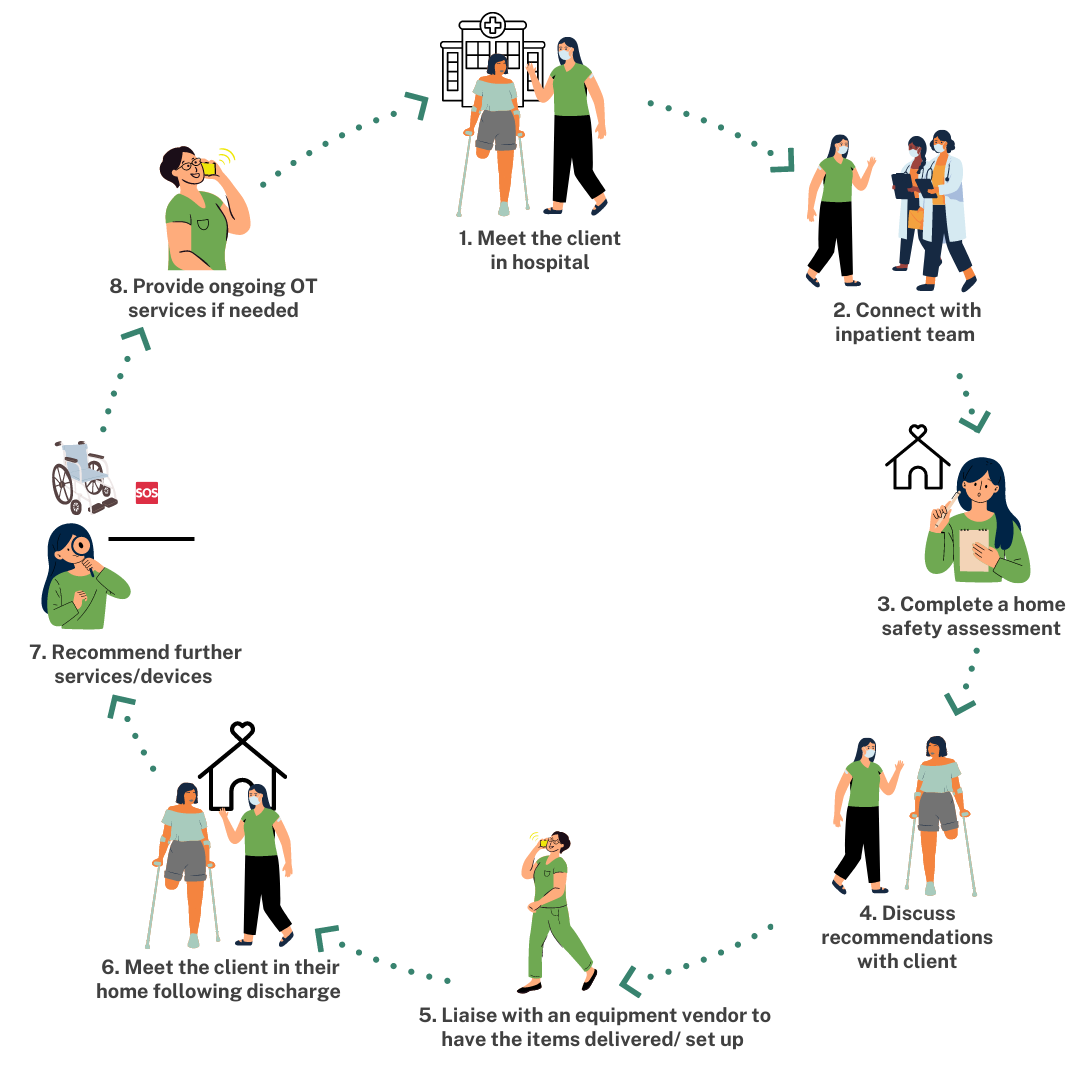
How Can a Health Bound Occupational Therapist (OT) Help You With Discharge Planning?
Our publicly funded healthcare system pays for various healthcare procedures and surgeries, hospital stays and some outpatient rehabilitation services. As Canadians, we are lucky to have this coverage and rely on it from birth to old age. However, despite the various services that are covered by the OHIP system, our publicly funded healthcare system is also limited when it comes to providing continuity of care, especially when you’re being discharged from the hospital to home. You may be surprised to know that medical devices, such as toilet safety equipment, rental mobility devices, such as wheelchairs and walkers, and more are not often covered by OHIP. Additionally, home safety assessments and ongoing visits from healthcare providers like physiotherapists (PTs) and occupational therapists (OTs) are very limited and are often accompanied by very long wait times depending on your geographic region. As we know, hospitals are under immense pressure to discharge patients as there are long wait times for hospital beds, and therefore, many patients cannot wait in the hospital for a home safety assessment to be completed or for assistive devices to be purchased and installed before they go home. What this means, is that once a patient is medically stable, they are often provided with the most basic equipment recommendations from their healthcare teams and discharged home. Sometimes, depending on the patient’s geographic location they may have access to an OT or a personal support work (PSW) service within a day or so after discharge, however that depends on what is available in your location and if you qualify for this service.
Our healthcare in Ontario is provided through various Home and Community Care Support Services (HCCSS), each of them covering a different geographic area in Ontario. Some HCCSS may have longer wait times and less coverage for certain services than others, hence, if your hospital roommate has been granted 3 days of PSW visits per week at their discharge that may not mean you will have access to the same service, even if you have higher medical needs. It is always important to begin these discussions with your hospital discharge planner or social worker to understand the limitations of the in-home care in your area and start making discharge plans.
If you find yourself days before your estimated discharge date and feel that you do not have the necessary services or equipment in place you can contact a privately funded healthcare organization, such as Health Bound Health Network which will assign an Occupational Therapist that can assist you with all your discharge planning needs. OTs are healthcare providers whose main goal is to increase your independence and safety within your environment despite any limitations that you might have. Whether it’s a recent motor-vehicle accident that results in your hospitalization, a recent hip replacement surgery, or a brain injury an OT can work with you to understand your needs and make recommendations to increase your safety and independence.
What Can an OT Do to Help With Your Discharge?

Once you begin working with one of Health Bound OTs they’ll contact you to schedule an initial consultation where they’ll explain their role obtain your informed consent to provide services and better understand your needs and goals with discharge. Your Health Bound OT will then connect with the hospital team, which often includes your inpatient OT, PT, Social Worker or nurse to gain a better understanding of their recommendations and will liaise with them to provide you with the necessary services and devices in time for discharge. Your OT will then schedule a home safety visit to assess your home and provide recommendations for making your home more accessible and safer for your return home. They will reconnect with you and provide you with a list of the recommended devices and with your consent they will oversee that those devices are purchased and installed prior to your arrival home. Whether it’s a ramp, bathroom equipment, or a bedrail these items will be installed and ready for you when you arrive home. After your discharge, your OT will meet you in your home to go over the equipment recommendations made, practice transfers, and assess your overall function within your home. They will also assess if any further services are needed for you to feel safe and comfortable in your home. Health Bound offers in-home as well as clinic-based physiotherapy, SLP, psychological counselling, rehabilitation support work services and personal support work which our OTs can discuss with you further and facilitate for you.
Funding Options for Private Services
Having access to these privately funded services will undoubtedly increase your comfort and safety in the home, reduce your chances of injury and rehospitalization and provide you confidence that your home is set up to meet your needs and limitations. However, not everyone can afford to pay out-of-pocket for these services. Luckily, there are a few available funding sources that may provide you with coverage.
Automobile Insurance Accident Benefits
If you have been involved in a Motor Vehicle Accident and have sustained injuries you are eligible to claim accident benefits with your auto insurance. Benefits that you would be entitled to as a result of this accident include; Medical and Rehabilitation Benefits, Attendant Care Benefits, Caregiver Benefits, Income Replacement Benefits, and Lost Educational Expenses, just to name a few. Our organization holds a FSRA (Financial Services Regulatory Authority of Ontario) license and does direct billing to insurance companies to simplify the funding process for our clients. Our fees, as well as billing procedures, are regulated by FSRA. Our OTs can explain the funding process to you further and will be liaising with your auto insurance adjuster to ensure that the services and devices that you require will be approved/covered by the insurer.
Workers Compensation Benefit Overview WSIB/WCB
Individuals who have been hurt or injured as a result of a work-related incident may have access to the Workplace Safety and Insurance Board (WSIB), which may provide you with funding for various healthcare services and assistive devices. Health Bound has the ability to directly bill WSIB, however, we recommend that you connect with your supervisor and find out if you have this coverage.
Extended Health Insurance/ODSP/Ontario Works
These funding sources can also be considered for paying for healthcare services or medical devices. We recommend that you contact your insurance company or case worker to understand what services and devices are covered by your policy. We have clients who use their extended health insurance through workplace group benefit programs arranged by their employer, unions and trade, and professional associations. Our clients make use of this funding for the various services that we offer, such as physiotherapy, registered massage therapy, custom-made orthotics, chiropractic, etc.
We hope that this article has helped you see the value of having a privately funded OT assist you with your discharge from the hospital to home. If you or a loved one could benefit from our in-home services feel free to contact us at [email protected] and we would be happy to connect with you and provide more details regarding our services, fees, and procedures.

